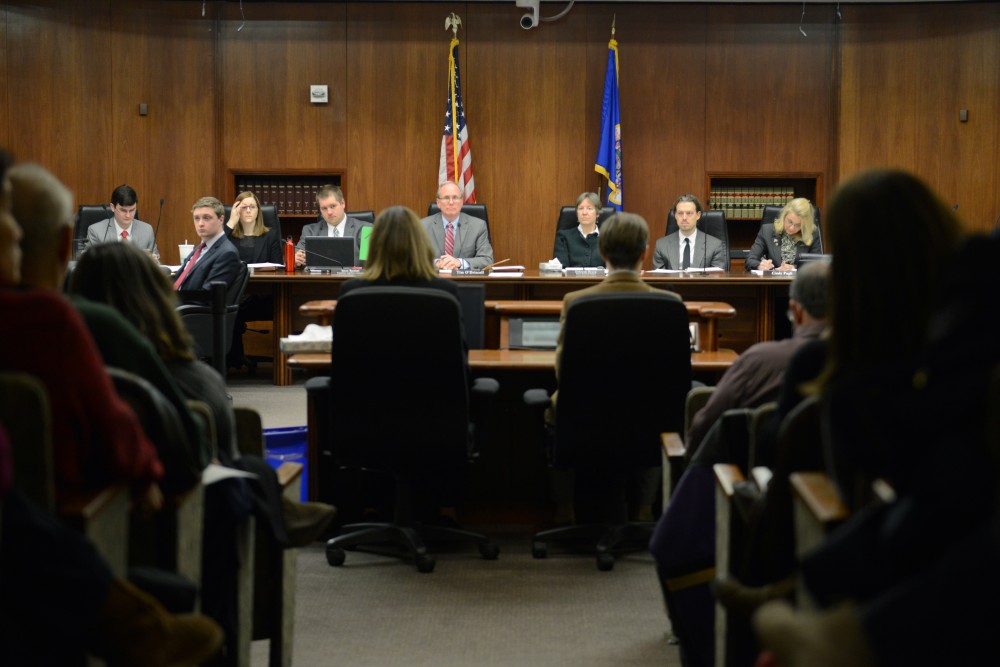State lawmakers could halt a potential Minneapolis minimum wage hike in its tracks.
A bill that would stop Minnesota cities in the state from passing their own labor laws — like minimum wage and paid sick leave — has cleared its first set of obstacles.
Legislators supporting the bill say it would prevent a “haphazard patchwork” of regulations, but opponents think a lack of state action has driven cities to craft their own rules.
The legislation would cancel local labor ordinances passed on or after Jan. 1, 2016 — effectively stymying the paid sick leave ordinances passed in Minneapolis and St. Paul last year. The bill passed its second House committee hearing Feb. 8.
One of the bill’s authors, Rep. Pat Garofalo, R-Farmington, said the legislation would bring all city minimum wage and sick leave policies in line with the state.
The bill is necessary to keep the state’s cities from enacting their own labor policies, Garofalo said, which would make it “impossible to do work here.”
“Minneapolis and St. Paul started it, but now other communities are picking up on it,” he said.
Garofalo said Minneapolis’ and St. Paul’s sick leave ordinances could impact those who don’t live in the city but work there temporarily.
The ordinance would make rural businesses provide sick leave for employees who work in the cities long enough to meet the threshold, he said. “It’s a regulatory nightmare.”
A potential minimum wage hike in either of the Twin Cities could also hurt the economy of rural Minnesota, said bill co-author Rep. Gene Pelowski, DFL-Winona.
Minnesota’s rural workforce could shrink if the metro minimum wage increases and draws workers, he said, adding that statewide preemption is a “fairness issue.”
“We’re having trouble in greater Minnesota, just as everybody is, with having a workforce,” Pelowski said. “It doesn’t help us if salaries are improved in the metropolitan areas.”
But not all support the proposed legislation.
Ward 3 Minneapolis City Council member Jacob Frey said the paid sick leave ordinance the council passed in May would “significantly help” people by letting them recover from illness without financial burden.
Paid sick leave passed after a previous version of the ordinance was scrapped and reworked over the course of seven months.
“Obviously you don’t want that work to be for naught,” Frey said.
He said he and others on the council are ready to testify against the bill if necessary, and added they have lobbyists working to stop the bill.
At the Feb. 8 House Government Operations and Elections Policy Committee meeting, Ward 8 council member Elizabeth Glidden told lawmakers the city chose to act on paid sick leave because the state failed to.
“We are all learning quite quickly which of you have an interest in the safety and security of the American worker, and which of you instead serve to enlarge the bottom lines of the corporate voices,” said Sanjeev Mishra, a leader with Neighborhoods Organizing for Change.
Small business owners and community advocates also voiced opposition to the bill at the meeting.
“[By passing this bill], you’d be telling the cities and counties in Minnesota that you know better than they do on how to govern themselves,” said Jeffrey Benny, St. Louis Park resident and owner of Benny Machine Company.
Frey said the bill’s effects could go beyond preempting sick leave and minimum wage increases.
“Depending on how they draft the statute, we could be prevented from doing practically everything but filling potholes,” he said.
Still, Pelowski said the statute wouldn’t stop employers from raising workers’ wages or providing paid sick time.
“[It] should be left up to the employer, not up to a municipality to mandate it,” he said.
After its latest committee approval, the bill will now head to the House Ways and Means Committee.
So far, the bill has gained bipartisan support, Garofalo said, and legislators have added provisions to the bill that Gov. Mark Dayton supports to increase its chance of approval.
Correction: A previous version of this story incorrectly stated Sanjeev Mishra’s title. He is a leader with Neighborhoods Organizing for Change.

















